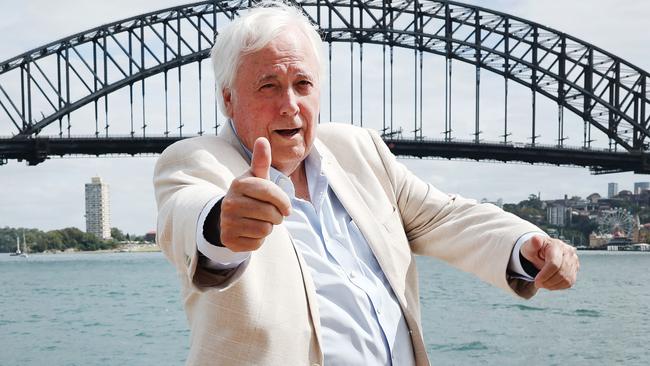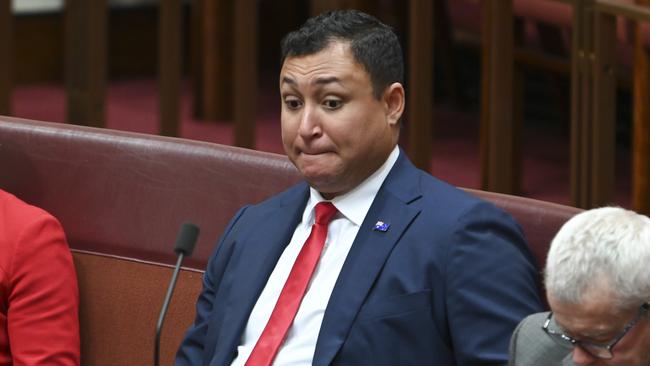Clive Palmer, Climate 200 expected to be able to spend up big at next election
There are increasing expectations that billionaire Clive Palmer and Climate 200 will be able to spend big at the federal election as the government runs out of time to put electoral reforms in place.

There are increasing expectations across the parliament that billionaire Clive Palmer and Climate 200 will still be able to spend big at the next federal election, with Anthony Albanese unlikely to have enough time to put in place sweeping electoral reforms.
Special Minister of State Don Farrell isn’t due to introduce the package, which includes real-time disclosure of donations of more than $1000, as well as spending and donation caps, until November.
With a majority of crossbenchers demanding the legislation be properly scrutinised, despite proposals having already been subjected to the joint standing committee on electoral matters, they now fear the government has left it too late to pass the changes before heading to the polls.
There is also a view within parliament that even if the government was able to legislate part or all its reforms, they wouldn’t be able to take effect until after the election because neither the Australian Electoral Commission nor political parties would have enough time to implement them.
“Labor has left this too late, so it looks unlikely these reforms will pass before the election,” independent Victorian senator Lidia Thorpe said.
“It’s not clear when the election will be called but an important bill like this needs to go through an inquiry process. At the moment, it’s impossible to run a successful campaign against the major parties without huge spending.”
Ahead of parliament resuming on Tuesday for the third and final joint sitting week of the year, The Australian has confirmed there is overwhelming support among crossbench MPs for real-time disclosure of donations of more than $1000 but the Coalition is pushing for monthly releases.
The Prime Minister will fly on Wednesday to Laos for the ASEAN summit, where he is expected to meet with Chinese Premier Li Qiang, and the Coalition is pushing to fast-track legislation to respond to recent pro-Palestinian protests where Hezbollah flags were carried.
An inquiry into the Criminal Code Amendment (Hate Crimes) Bill – which expands the list of groups protected by the public display of prohibited hate symbol offences – isn’t due to report until mid-December, meaning the Coalition would have to get Senate support to push the legislation through parliament.
“No Australian should be targeted because of who they are or what they believe,” Attorney-General Mark Dreyfus said. “The Senate, including Coalition senators, set the reporting date for the bill.”
As key Albanese government legislation faces a Senate stalemate, including its Future Made in Australia plan, the establishment of an environmental watchdog and housing programs, Senator Farrell has insisted he wants to build a consensus across the political divide for his electoral reforms.
The teals want any caps on expenditure and donations to account for a candidate’s incumbency and advantages held by political parties, or much higher donation caps for independents and challengers of incumbents.
“No reform is better than bad reform,” teal MP and member for Kooyong Monique Ryan said.
“Donation and spending caps will be meaningful only if they put a stop to hidden donations via undisclosed sources of financial support, like associated entities, party branches and unions – and loopholes such as those allowing ‘cash for access’ fundraisers.”
United Australia Party senator Ralph Babet, who was Mr Palmer’s only candidate to win a seat at the last election after the mining magnate spent $116m, was opposed to the government’s overhaul in its entirety except “potentially” real-time reporting of donations.

Senator Farrell has delayed the package’s introduction to parliament for months, conceding there has been drafting issues as the government gears up for a potential High Court challenge from Mr Palmer over donations caps limiting political communication.
“Labor and the Coalition benefit from significant taxpayer funding as well as unions, big donors and media coverage,” Senator Babet said.
“Minor parties and independents do not have this luxury. Any donation caps are intended to eliminate all competition to the Lib-Lab duopoly.”
Greens senator Larissa Waters said the party remained suspicious that Labor and the Coalition would “gang up to rig the system to benefit themselves and lock out smaller parties and new entrants”.
“Since we last met on 16 May, there has been no consultation from minister Farrell on electoral reform,” she said.
Senator Farrell’s spokeswoman said he was willing to talk to anyone across parliament to get consensus “to make the system better and stronger”.
“The Special Minister of State has flagged the introduction of legislation this year and is currently consulting across parliament to secure commonsense reform to our electoral system,” she said. “The government’s reforms are focused on tackling the issue of big money in our politics, reforming both donations and campaign spending. Billionaires should not be able to buy our elections.”
Senator Thorpe and independent senator David Pocock, from the ACT, said the government’s electoral reforms were “urgent”, with the current system favouring the major parties – whose primary votes have dropped to historic lows.
“The urgent priority ahead of the next federal election must also be introducing strong truth in political advertising laws and banning the use of generative AI in electoral matters. Failing to do this threatens the strength of our democracy,” Senator Pocock said.
Crossbenchers were split on whether independent candidates required multimillion-dollar campaigns to get elected, with Liberal defector-turned-independent Gerard Rennick saying big money was necessary, long-time maverick MP Bob Katter saying it wasn’t, and independent Victorian MP Helen Haines saying it shouldn’t be a requirement.
“It’s not in the best interests of anyone for this to continue. I do want to see electoral reforms which reduce the impact of big money on Australian elections,” Ms Haines said.
“I am disappointed by the delay in introducing electoral reforms by the government and I am concerned we are running out of time in this term of parliament to properly debate and pass strong electoral reform that improves our democratic processes, increases transparency and levels the playing field for new entrants.”




To join the conversation, please log in. Don't have an account? Register
Join the conversation, you are commenting as Logout